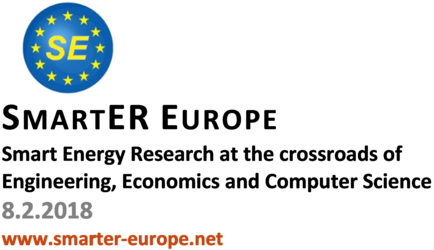Call for Papers

The transformation process of the European energy system faces major challenges. Information technologies and computer systems are perceived as a key enabler for future sustainable production and consumption patterns. Yet still multiple issues are awaiting clarification - besides technical and economic solutions, social and political as well as organizational and juridical aspects must be considered. Especially, the complex and manifold interdependencies between involved technologies, multiple and internationally varied regulations and convincing business cases require particular attention. Furthermore, the ongoing transformation of the energy sector requires to consider both long-term solutions and concepts with perceptible short- to mid-term benefits.
New solutions are needed to maintain or even increase the reliability and the security of energy supply in more decentralized systems. Additionally, newly designed energy markets should enable an efficient and transparent matching of supply and demand for energy and ancillary services in large-scale networks. This requires the analysis and handling of much more data and advanced algorithms for forecasting, operation and matching, especially decentralized, generation and load. The resulting overall system is thus going to be significantly more complex and interlinked. Considering those conditions, decentralized and autonomous agents may enable a robust high-performance system operation. Further, the interactions between the market level and the technical system operation have to be considered carefully
Although significant efforts and investments have already been made for developing Smart Grids and Smart Markets, significant research questions need to be answered before Smart Grids will become reality. Particularly, sector coupling and hybrid energy infrastructures considering not only electricity but also other grid-based energy carriers like natural gas and heat become increasingly important. Additional flexibility as well as additional complexity is gained when these networks interact to meet the requirements of a decentralized, diversified, secured, sustainable and stable future energy supply.
Regardless of whether and how the energy system will be designed and operated in the future, it is obvious that a key enabler for a successful transformation of the energy supply will be a purposefully designed and used ICT infrastructure. However, new solutions will consolidate and represent the combined knowledge of different disciplines as engineering, business management and economics as well as computer science. These new solutions will contribute significantly to an efficient energy supply and to the success of involved companies. The IT backbone for such solutions are likely to be distributed, collaborative, autonomous and intelligent software packages for simulation, monitoring, control and optimization as well as appropriate data and business models, reporting systems and maybe also mobile solutions.
Topics
The SmartER-Europe Conference aims at providing an interdisciplinary forum for presenting and discussing recent advances and experiences in building and using new IT-based solutions for Smart Grids and Smart Markets. For this, the conference provides a forum for different scientific disciplines. Furthermore, it enables an industrially relevant exchange of knowledge and experience. In particular, it includes (but is not limited to) the following areas and topics of interest:
Smart Grid, Smart Home and Automation
- Decentralized control systems
- Stability in Energy Grids
- Distributed Optimization in Energy Networks
- Multi-Agent based Systems and Simulations
- Self-aware, self-configuring or self-healing systems
- Models & Simulation of Smart Grids
- Approaches for Hybrid Energy Networks (Integrated Energy Systems)
- Operation and expansion planning in Smart Grids
- Smart House Concepts
- Industrial Energy Management
- Energy Supply in Urban Areas & Smart Cities
Smart Software & Data Handling
- Open Software Solutions
- Data Storing and Proceeding Technologies
- Big Data
- Software Tools for Smart Energy Networks
- Data Security
- Data Structures and required Standards
- Mobile Solutions
- Human agent interaction, user interfaces
Smart Markets, Trading and Business models
- Forecasts / Predictions
- Management of distributed generation and storage
- Distributed planning processes for energy systems
- Products and User Interfaces
- Competition analyses
- Process Management
- Integration of possible Smart-technologies (e.g. Storage Systems)
- Agent cooperation and negotiation, Agent Behaviors and Artificial Markets
- Decision Making in Dynamic Information Environments
- Adaptation, learning and personalization
- Optimization of business models and algorithms
- Market instruments for energy efficiency
